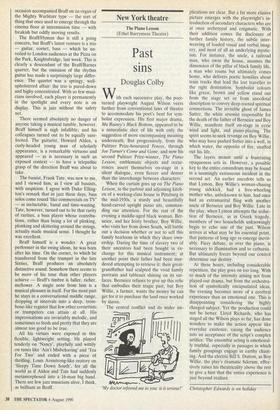New York theatre
The Piano Lesson (Ethel Barrymore Theatre)
Past sins
Douglas Colby
With each successive play, the poet- turned playwright August Wilson veers further from conventional laws of theatre to accommodate his poet's bent for sym- bolist expression. His first major drama, Ma Rainey's Black Bottom, appeared to be a naturalistic slice of life with only, the suggestion of more encompassing meaning underneath. But progressively, from the Pulitzer Prize-honoured Fences, through Joe Turner's Come and Gone, and now his second Pulitzer Prize-winner, The Piano Lesson, emblematic objects and occur- rences assert themselves on-stage in a silent dialogue, even fiercer and denser than the interchange between characters.
When the curtain goes up on The Piano Lesson, in the parlour and adjoining kitch- en of a working-class house in Pittsburg in the mid-1930s, a sturdy and beautifully hand-carved upright piano sits, comman- ding our attention. For the rest of the evening a middle-aged black woman, Ber- neice, and her feisty brother, Boy Willie, who visits her from down South, will battle out a decision whether or not to sell this family heirloom in which they share own- ership. During the time of slavery two of their ancestors had been bought in ex- change for this musical instrument; at another point their father had been mur- dered attempting to retrieve it; their great- grandfather had sculpted the vivid family portraits and tableaux shining on its sur- faces. Berneice refuses to give up this relic that embodies their tragic past, but Boy Willie, a farmer, wants the money he can get for it to purchase the land once worked by slaves.
The central conflict and its wider im- 'My doctor referred me to you: is it serious?'
plications are clear. But a far more elusive picture emerges with the playwright's in- troduction of secondary characters who are at once archetypal and enigmatic. With their addition comes the disclosure of further family history, the subtle inter- weaving of loaded visual and verbal imag- ery, and most of all an underlying mystic- ism. For instance, the uncle, a railroad man, who owns the house, assumes the dimension of the pillar of black family life, a man who roams but ultimately comes home, who delivers poetic homilies about train tracks that lead the lost traveller to the right destination. Symbolist colours like green, brown and yellow stand out from the stage set or from anecdotal description to convey deep-rooted spiritual connections. The invisible ghost of James Sutter, the white arsonist responsible for the death of the father of Berneice and Boy Willie, manifests itself on-stage in eerie wind and light, and piano-playing. The spirit seems to seek revenge on Boy Willie, who may have pushed Sutter into a well, in which water, the opposite of fire, snuffed out his life.
The layers mount until a frustrating opaqueness sets in. However, a possible key to the entire conundrum may be found in a seemingly extraneous incident in the second act. An earlier anecdote tells us that Lymon, Boy Willie's woman-chasing young sidekick, had a free-wheeling mother who, unbeknown to him, had once had an extramarital fling with another uncle of Berneice and Boy Willie. Late in the play, when Lymon attempts the seduc- tion of Berneice, as in Greek tragedy, members of two households unknowingly begin to echo sins of the past. Wilson arrives at what may be his essential point, that patterns of long ago re-emerge inevit- ably. Fiery debate, as over the piano, is necessary to illumination and to catharsis. But ultimately forces beyond our control determine our destiny.
At three hours, including considerable repetition, the play goes on too long. With so much of the intensity arising not from played-out drama, but from the orchestra- tion of symbolically encapsulated ideas, the evening becomes more of a cerebral experience than an emotional one. This is disappointing considering the highly charged subject. Yet the production could not be better. Lloyd Richards, who has staged all the Wilson plays so far, has done wonders to make the action appear like everyday existence, easing the audience into an acceptance of the script's complex artifice. The ensemble acting is emotional- ly truthful, especially in passages in which family groupings engage in earthy chant- ing. And the electric Bill S. Dutton, as Boy Willie, the play's dramatic fulcrum, effec- tively raises his theatricality above the rest to give a hint that the entire experience is just beyond realism.
















































 Previous page
Previous page